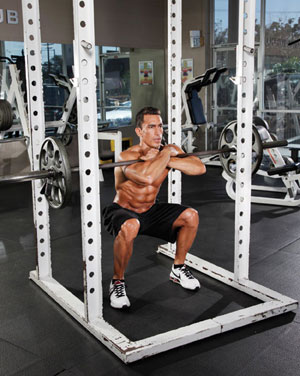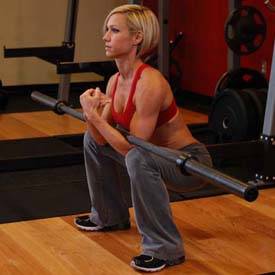Recomposition: Maintaining weight while losing fat
Replies
-
Probably, a reasonable deficit, with at least that kind of workout, and protein levels that several have mentioned, should easily retain any muscle mass the workout is enough stimuli for.
Obviously if you used to squat 200 lbs more and now can't do "squat" weight, even existing muscle won't be needed and body would likely be willing to not rebuild some of it. But that workout could stretch the time it matters, and obviously the bigger the difference between before and now matters.
But sometimes in life, you gotta make do with doing all you can in your realm of control, and if different results than prior circumstances allowed, so be it.
Still doing all you can.
And that's what matters to realistic goals.2 -
-
Great thread0
-
Probably, a reasonable deficit, with at least that kind of workout, and protein levels that several have mentioned, should easily retain any muscle mass the workout is enough stimuli for.
Obviously if you used to squat 200 lbs more and now can't do "squat" weight, even existing muscle won't be needed and body would likely be willing to not rebuild some of it. But that workout could stretch the time it matters, and obviously the bigger the difference between before and now matters.
But sometimes in life, you gotta make do with doing all you can in your realm of control, and if different results than prior circumstances allowed, so be it.
Still doing all you can.
And that's what matters to realistic goals.
Once again, thank you for the invaluable input, and for the support. It's hugely appreciated.1 -
Approximately 5 lbs from maintenance, following.0
-
tagging to finish reading later as there are now 11 pages. Thank you so much for this. I am a few pounds under my goal (but I did not have an ambitious goal - I did go from a size 12/14 to a size 6/8 though), but I am still rather flabby around the middle. I work out with a trainer once a week and run 3 times a week. I seem to have a very hard time making myself lift when there is not someone there telling me to do it. Just not my thing - but it is my goal to improve on that this summer - when perhaps the airconditioned gym may have some advantages over the sweltering heat outside running.1
-
Well, I got so absorbed that I finished it all. I noted that someone said Smith machines were bad for squats. I will do some squats with weights in front of me - but if I want the weight on my shoulders, I almost have to use the Smith machine because my right hand goes numb pretty quickly with the elbow bent that far. If I am using the Smith machine, I can drop that hand and feel fairly confident that I will not drop the weight. Does anyone have another suggestion for how I could use free weights without the numbness?0
-
wishiwasarunner wrote: »Well, I got so absorbed that I finished it all. I noted that someone said Smith machines were bad for squats. I will do some squats with weights in front of me - but if I want the weight on my shoulders, I almost have to use the Smith machine because my right hand goes numb pretty quickly with the elbow bent that far. If I am using the Smith machine, I can drop that hand and feel fairly confident that I will not drop the weight. Does anyone have another suggestion for how I could use free weights without the numbness?
Wait...what do you mean drop that hand?0 -
I can keep my left hand on the weight and let my right hand straighten and since the weight is on a track, it will not fall.0
-
arditarose wrote: »wishiwasarunner wrote: »Well, I got so absorbed that I finished it all. I noted that someone said Smith machines were bad for squats. I will do some squats with weights in front of me - but if I want the weight on my shoulders, I almost have to use the Smith machine because my right hand goes numb pretty quickly with the elbow bent that far. If I am using the Smith machine, I can drop that hand and feel fairly confident that I will not drop the weight. Does anyone have another suggestion for how I could use free weights without the numbness?
Wait...what do you mean drop that hand? 3
3 -
wishiwasarunner wrote: »I can keep my left hand on the weight and let my right hand straighten and since the weight is on a track, it will not fall.
No no. Don't do that. Have you watched a video on proper squat form yet?0 -
yes and I work out with a trainer as well. Not trying to derail the topic though - so we can move on. Just was hoping for some help with a nerve compression issue that prevents me from bending my right elbow that much0
-
wishiwasarunner wrote: »yes and I work out with a trainer as well. Not trying to derail the topic though - so we can move on. Just was hoping for some help with a nerve compression issue that prevents me from bending my right elbow that much
I'm guessing when you front squat you hold the bar like this:
Other solutions are these grips:
Or you can do zombie squats:
Or zerchers:
Or goblet squats:

6 -
@wishiwasarunner sorry I didn't see you were talking about front squats. Those are all great alternatives. I do california/cross armed style myself.0
-
Is a recomp. diet similar to carb cycling?There's a lot of talk about recomposition through the boards, so I wanted to have a place where we can compile research on it and experiences with it.
When is recomp appropriate? When you are at a decent weight for your height, but your body fat is still at a level that is undesirable to you recomposition is probably a good option. It's a way to maintain your weight, eat well and still lose fat. This is a slow process and can feel like spinning your wheels, but it can be less mentally stressful than bulk and cut cycles.
The keys to recomposition are:
1. At the end of the week you have eaten at about your TDEE. You may choose to cycle calories or eat at a flat rate every day, there are studies that support both, but start with personal preference. If you have a consistent workout schedule using a TDEE calculator should place your goal fairly close to your actual maintenance. The only way to know for sure is to monitor your weight and calories over time while adjusting calories when you have an up or down trend.
2. Getting adequate protein. Protein is a building block of muscle. The goal of recomposition is to build muscle and lose fat at the same time. Protein, carbohydrates and fats play different roles in the muscle building process, so make sure that you keep to a macronutrient set up that works for you. This may need to be adjusted over time.
3. Lift! Following a good lifting program is the key to the entire process. It's where the magic happens. Pick a program that you will enjoy and that is going to challenge you. Continue to focus on improving.
4. Take pictures and measure. It's a slow process and you may feel you are making no progress. Your measurements will help you see that you are making progress.
Feel free to share stories of recomposition and any research you have seen on it. Ask questions if you have any.
0 -
There's a lot of talk about recomposition through the boards, so I wanted to have a place where we can compile research on it and experiences with it.
When is recomp appropriate? When you are at a decent weight for your height, but your body fat is still at a level that is undesirable to you recomposition is probably a good option. It's a way to maintain your weight, eat well and still lose fat. This is a slow process and can feel like spinning your wheels, but it can be less mentally stressful than bulk and cut cycles.
The keys to recomposition are:
1. At the end of the week you have eaten at about your TDEE. You may choose to cycle calories or eat at a flat rate every day, there are studies that support both, but start with personal preference. If you have a consistent workout schedule using a TDEE calculator should place your goal fairly close to your actual maintenance. The only way to know for sure is to monitor your weight and calories over time while adjusting calories when you have an up or down trend.
2. Getting adequate protein. Protein is a building block of muscle. The goal of recomposition is to build muscle and lose fat at the same time. Protein, carbohydrates and fats play different roles in the muscle building process, so make sure that you keep to a macronutrient set up that works for you. This may need to be adjusted over time.
3. Lift! Following a good lifting program is the key to the entire process. It's where the magic happens. Pick a program that you will enjoy and that is going to challenge you. Continue to focus on improving.
4. Take pictures and measure. It's a slow process and you may feel you are making no progress. Your measurements will help you see that you are making progress.
Feel free to share stories of recomposition and any research you have seen on it. Ask questions if you have any.
I've actually been very curious about the bolded part for a while now. Do you mind linking whatever studies you've come across on this? I'd be interested in seeing what if any differences were noted. Thanks!
Apologies if you already posted them, I only read the first page of the thread before posting.
I posted some in another thread, let me see if I can find it.
I found this study, but it wasn't recomposition. I will keep looking for the ones that I posted.
http://onlinelibrary.wiley.com/doi/10.1111/j.1467-789X.2011.00873.x/abstract;jsessionid=6DBE313026EAAB4F827222DFF90314DA.f02t04
If you can find them, that would be great. There are differing 'schools of thought' that I have seen on this but have not seen any studies. I would be very interested in seeing them (genuine interest, unlike certain others ) as the steady v varying intake comes up quite a bit.
) as the steady v varying intake comes up quite a bit.
Will try to find the full text of the one you linked - the concept of FFM retention could be due to timing of calories around training sessions, and as a result, more effective training (i.e. more LBM retention) - but on a cut, you have less calories to play with and as such, timing of meals is more important, as compared to maintenance so I would conjecture that this holds less true. However, I am assuming here, so as I say, will try to find the full text.
I forgot all about looking when the thread blew up yesterday. I will look when I have a chance today.
Your mention of timing around training reminds me of the section in this (I linked it yesterday): http://www.jissn.com/content/11/1/20
It's about cutting and pertains to people on the low end of the body fat spectrum, but I do wonder if nutrient timing is less important for someone who isn't close to being competition lean. Either way, as you know, individual preference and adherence is far more important than sticking with ideals.
The full article from what I linked above is here: http://onlinelibrary.wiley.com/doi/10.1111/j.1467-789X.2011.00873.x/full
come back to0 -
LiveLoveSwimming wrote: »
Is a recomp. diet similar to carb cycling?There's a lot of talk about recomposition through the boards, so I wanted to have a place where we can compile research on it and experiences with it.
When is recomp appropriate? When you are at a decent weight for your height, but your body fat is still at a level that is undesirable to you recomposition is probably a good option. It's a way to maintain your weight, eat well and still lose fat. This is a slow process and can feel like spinning your wheels, but it can be less mentally stressful than bulk and cut cycles.
The keys to recomposition are:
1. At the end of the week you have eaten at about your TDEE. You may choose to cycle calories or eat at a flat rate every day, there are studies that support both, but start with personal preference. If you have a consistent workout schedule using a TDEE calculator should place your goal fairly close to your actual maintenance. The only way to know for sure is to monitor your weight and calories over time while adjusting calories when you have an up or down trend.
2. Getting adequate protein. Protein is a building block of muscle. The goal of recomposition is to build muscle and lose fat at the same time. Protein, carbohydrates and fats play different roles in the muscle building process, so make sure that you keep to a macronutrient set up that works for you. This may need to be adjusted over time.
3. Lift! Following a good lifting program is the key to the entire process. It's where the magic happens. Pick a program that you will enjoy and that is going to challenge you. Continue to focus on improving.
4. Take pictures and measure. It's a slow process and you may feel you are making no progress. Your measurements will help you see that you are making progress.
Feel free to share stories of recomposition and any research you have seen on it. Ask questions if you have any.
You do not have to carb cycle or calorie cycle if you don't want to.
At first I was adjusting my calories based on my exercise for the day. I wanted to use the extra calories as another motivator to continue to work out. It started to become too complicated to adjust 3 different calorie scenarios (cardio, strength, rest). I switched to TDEE for the simplicity of it.0 -
I am pretty much in a recomp. I suppose I have been for a couple years but the last 6-10 months I've been a little more focused. I don't do anything special, I just train hard both for strength and conditioning. I run very occasionally, & hike a good bit. I'm starting to play with carb cycling to see if that adds anything to my approach. I plan to eat fewer carbs on off days, nothing too major. I'll have to dig up some pics to post and show my results. I'd probably have done even better if I was more detailed and stricter with my eating. But being extremely lean isn't worth the effort0
-
LiveLoveSwimming wrote: »
Is a recomp. diet similar to carb cycling?There's a lot of talk about recomposition through the boards, so I wanted to have a place where we can compile research on it and experiences with it.
When is recomp appropriate? When you are at a decent weight for your height, but your body fat is still at a level that is undesirable to you recomposition is probably a good option. It's a way to maintain your weight, eat well and still lose fat. This is a slow process and can feel like spinning your wheels, but it can be less mentally stressful than bulk and cut cycles.
The keys to recomposition are:
1. At the end of the week you have eaten at about your TDEE. You may choose to cycle calories or eat at a flat rate every day, there are studies that support both, but start with personal preference. If you have a consistent workout schedule using a TDEE calculator should place your goal fairly close to your actual maintenance. The only way to know for sure is to monitor your weight and calories over time while adjusting calories when you have an up or down trend.
2. Getting adequate protein. Protein is a building block of muscle. The goal of recomposition is to build muscle and lose fat at the same time. Protein, carbohydrates and fats play different roles in the muscle building process, so make sure that you keep to a macronutrient set up that works for you. This may need to be adjusted over time.
3. Lift! Following a good lifting program is the key to the entire process. It's where the magic happens. Pick a program that you will enjoy and that is going to challenge you. Continue to focus on improving.
4. Take pictures and measure. It's a slow process and you may feel you are making no progress. Your measurements will help you see that you are making progress.
Feel free to share stories of recomposition and any research you have seen on it. Ask questions if you have any.
No, they are totally separate concepts. You can carb cycle on a recomp, but for most people it's unnecessary.
Recomposition is basically eating at maintenance calories and lifting. It is a way to lower body fat and add lean mass without having to do bulk and cut cycles. It improves body composition, so that you don't have to drop to an unhealthy weight to reduce body fat levels. It also makes getting and staying lean easier.3 -
Bump1
-
Is there an ideal BMI for recomp or is it down to personal perference?
Will the same person at a lower end of his healthy BMI achieve a recomp harder than if he is at a higher end due to less muscle lost from dieting? So at the lower end you would have essentially less "total" fat (and muscle ofc) would that lead to handling that fat easier? Or is it easier to do a recomp at a higher BMI and then after the recomp lose the last 10-15lbs.?
How much more time "consuming" is it to do a recomp in comparison to bulk/cut cycles to reach the same result?
Like 2x the time you would do with bulk/cut cycles or aprox the same?
Ps. Those might be silly questions to some, but i wanted to ask anyway.
0 -
I haven't seen anything BMI-based but from what I've read in the past, being overweight, underweight, low weight, or skinny fat are not ideal for recomping. I look at the bodybuilding.com female forums and here is a post from somebody who usually has fairly good advice. She estimates a good range, bf-wise, is 24-30% for women.1
-
Is there an ideal BMI for recomp or is it down to personal perference?
Will the same person at a lower end of his healthy BMI achieve a recomp harder than if he is at a higher end due to less muscle lost from dieting? So at the lower end you would have essentially less "total" fat (and muscle ofc) would that lead to handling that fat easier? Or is it easier to do a recomp at a higher BMI and then after the recomp lose the last 10-15lbs.?
How much more time "consuming" is it to do a recomp in comparison to bulk/cut cycles to reach the same result?
Like 2x the time you would do with bulk/cut cycles or aprox the same?
Ps. Those might be silly questions to some, but i wanted to ask anyway.
There isn't really an ideal place to start. Most people start when they are close to their goal weight and realize they need to improve body composition.
There is no standard answer for what starting point is ideal for someone because it would depend on their goals and simply where they happen to be with lean mass. Most people don't plan on reaching the end of weight loss just to have to recomp.
I don't know what lean mass gains on a recomp could be. We know approximates for a bulk, but I have no answer for that at maintenance. Not all bulks and cuts are the same length due to needs, so a recomp would be the same, how ever long it takes to hit your goal.0 -
I haven't seen anything BMI-based but from what I've read in the past, being overweight, underweight, low weight, or skinny fat are not ideal for recomping. I look at the bodybuilding.com female forums and here is a post from somebody who usually has fairly good advice. She estimates a good range, bf-wise, is 24-30% for women.
Okay, I read that post. If recomp is such a long, arduous process, why does anyone do it? Why doesn't everyone just bulk and cut? I don't see the difference in benefits between recomp vs. bulk and cut. Confused!0 -
I haven't seen anything BMI-based but from what I've read in the past, being overweight, underweight, low weight, or skinny fat are not ideal for recomping. I look at the bodybuilding.com female forums and here is a post from somebody who usually has fairly good advice. She estimates a good range, bf-wise, is 24-30% for women.
I would suggest body fat around 24%, but would be hesitant to suggest recomp for someone at 30% unless they are within the normal BMI range (because that means very low lean mass).
The reason we want to work on building muscle around or below 24% (for females) has to do with nutrient partitioning (how our body chooses to feed muscles versus fill fat stores). It's more applicable to bulking, but could play a roll in recomp.0 -
I haven't seen anything BMI-based but from what I've read in the past, being overweight, underweight, low weight, or skinny fat are not ideal for recomping. I look at the bodybuilding.com female forums and here is a post from somebody who usually has fairly good advice. She estimates a good range, bf-wise, is 24-30% for women.
Okay, I read that post. If recomp is such a long, arduous process, why does anyone do it? Why doesn't everyone just bulk and cut? I don't see the difference in benefits between recomp vs. bulk and cut. Confused!
Because not many people want to purposefully gain fat after taking the time and effort to lose it in the first place. Plus, when you bulk you have to be very dedicated to the gym and lifting. A recomp can be done by an average person who doesn't want to lift for an hour per day 5 days per week. If you eat for a bulk you lift like a bodybuilder or you will be gaining more fat than necessary.1 -
I haven't seen anything BMI-based but from what I've read in the past, being overweight, underweight, low weight, or skinny fat are not ideal for recomping. I look at the bodybuilding.com female forums and here is a post from somebody who usually has fairly good advice. She estimates a good range, bf-wise, is 24-30% for women.
Okay, I read that post. If recomp is such a long, arduous process, why does anyone do it? Why doesn't everyone just bulk and cut? I don't see the difference in benefits between recomp vs. bulk and cut. Confused!
I'm just going to link you my blog because it's long but explains why I chose recomp and why I still do it.
http://www.myfitnesspal.com/blog/ILiftHeavyAcrylics/view/why-recomp-works-for-me-748782
The short answer is chronic illness (eating at a deficit is too much stress on my system, at least it is while I'm also lifting), mental health (I had just lost 45 lbs and didn't feel ready to intentionally put on weight), and in the beginning, lack of experience and not knowing whether I'd really be able to effectively bulk. Also I really like maintenance. I don't care for eating a lot more for awhile and then having to eat a lot less again.0 -
Yeah, I would think that 30% is kind of high but I am around 26% and am focusing on recomp right now.
As for why do it if it is a long arduous process? I can only give you my perspective. Right now I go up and down from about 148-151 on a regular basis. I've been at approximately the same point since last November. I've been down to 147 and up to 152 but basically 148-151. I did have an extended maintenance break and then got back to losing but then found it really hard to eat at a deficit for longer than 4 weeks at at time. I was getting super obsessive about weighing myself daily even though I KNOW that weight loss isn't linear (lol.) During those 7 months I was losing inches so it's not like I had no progress, but it just wasn't showing (permanently) on the scale. So I decided to out and out commit to a recomp. So, for me, cutting down to a point where I would want to bulk would be way more arduous than saying "I feel pretty good at this weight. Let's sit here and just focus losing fat and building muscle."1 -
Thanks, those are very helpful answers. Planning to do a recomp when I get to my goal weight (7 lbs from now).1
-
I did mine very different. I went from bodybuilding competition lean to a bulk. I struggled to go back to cutting after a bit over a year bulking, so I decided to maintain for a while. My body fat was around 26% when I started the recomp, but it was at the end of a bulk versus the end of weight loss like a lot of people do.1
Categories
- All Categories
- 1.4M Health, Wellness and Goals
- 398.1K Introduce Yourself
- 44.7K Getting Started
- 261K Health and Weight Loss
- 176.4K Food and Nutrition
- 47.7K Recipes
- 233K Fitness and Exercise
- 462 Sleep, Mindfulness and Overall Wellness
- 6.5K Goal: Maintaining Weight
- 8.7K Goal: Gaining Weight and Body Building
- 153.5K Motivation and Support
- 8.4K Challenges
- 1.4K Debate Club
- 96.5K Chit-Chat
- 2.6K Fun and Games
- 4.8K MyFitnessPal Information
- 12 News and Announcements
- 21 MyFitnessPal Academy
- 1.5K Feature Suggestions and Ideas
- 3.2K MyFitnessPal Tech Support Questions

















